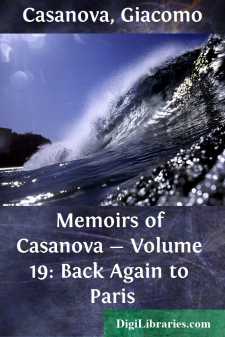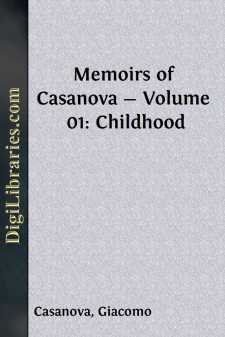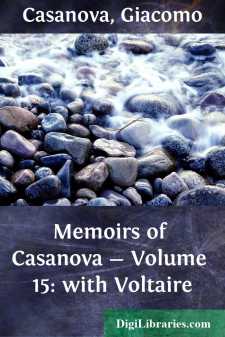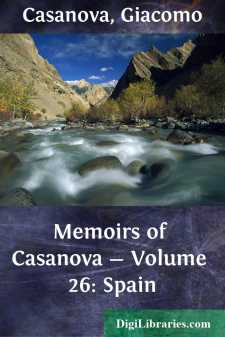Categories
- Antiques & Collectibles 13
- Architecture 36
- Art 48
- Bibles 22
- Biography & Autobiography 813
- Body, Mind & Spirit 142
- Business & Economics 28
- Children's Books 14
- Children's Fiction 11
- Computers 4
- Cooking 94
- Crafts & Hobbies 4
- Drama 346
- Education 46
- Family & Relationships 57
- Fiction 11828
- Games 19
- Gardening 17
- Health & Fitness 34
- History 1377
- House & Home 1
- Humor 147
- Juvenile Fiction 1873
- Juvenile Nonfiction 202
- Language Arts & Disciplines 88
- Law 16
- Literary Collections 686
- Literary Criticism 179
- Mathematics 13
- Medical 41
- Music 40
- Nature 179
- Non-Classifiable 1768
- Performing Arts 7
- Periodicals 1453
- Philosophy 64
- Photography 2
- Poetry 896
- Political Science 203
- Psychology 42
- Reference 154
- Religion 513
- Science 126
- Self-Help 84
- Social Science 81
- Sports & Recreation 34
- Study Aids 3
- Technology & Engineering 59
- Transportation 23
- Travel 463
- True Crime 29
Memoirs of Casanova - Volume 25: Russia and Poland
by: Giacomo Casanova
Categories:
Description:
Excerpt
My Stay at Riga—Campioni St. Heleine—D'Asagon—Arrival of the
Empress—I Leave Riga and Go to St. Petersburg—I See Society—I Buy
Zaira
Prince Charles de Biron, the younger son of the Duke of Courland, Major-General in the Russian service, Knight of the Order of St. Alexander Newski, gave me a distinguished reception after reading his father's letter. He was thirty-six years of age, pleasant-looking without being handsome, and polite and well-mannered, and he spoke French extremely well. In a few sentences he let me know what he could do for me if I intended to spend some time at Riga. His table, his friends, his pleasures, his horses, his advice, and his purse, all these were at my service, and he offered them with the frankness of the soldier and the geniality of the prince.
"I cannot offer you a lodging," he said, "because I have hardly enough room for myself, but I will see that you get a comfortable apartment somewhere."
The apartment was soon found, and I was taken to it by one of the prince's aides-de-camp. I was scarcely established when the prince came to see me, and made me dine with him just as I was. It was an unceremonious dinner, and I was pleased to meet Campioni, of whom I have spoken several times in these Memoirs. He was a dancer, but very superior to his fellows, and fit for the best company polite, witty, intelligent, and a libertine in a gentlemanly way. He was devoid of prejudices, and fond of women, good cheer, and heavy play, and knew how to keep an even mind both in good and evil fortune. We were mutually pleased to see each other again.
Another guest, a certain Baron de St. Heleine from Savoy, had a pretty but very insignificant wife. The baron, a fat man, was a gamester, a gourmand, and a lover of wine; add that he was a past master in the art of getting into debt and lulling his creditors into a state of false security, and you have all his capacities, for in all other respects he was a fool in the fullest sense of the word. An aide-decamp and the prince's mistress also dined with us. This mistress, who was pale, thin, and dreamy-looking, but also pretty, might be twenty years old. She hardly ate anything, saying that she was ill and did not like anything on the table. Discontent shewed itself on her every feature. The prince endeavoured, but all in vain, to make her eat and drink, she refused everything disdainfully. The prince laughed good-humouredly at her in such a manner as not to wound her feelings.
We spent two hours pleasantly enough at table, and after coffee had been served, the prince, who had business, shook me by the hand and left me with Campioni, telling me always to regard his table as my last resource.
This old friend and fellow-countryman took me to his house to introduce me to his wife and family. I did not know that he had married a second time. I found the so-called wife to be an Englishwoman, thin, but full of intelligence. She had a daughter of eleven, who might easily have been taken for fifteen; she, too, was marvellously intelligent, and danced, sang, and played on the piano and gave such glances that shewed that nature had been swifter than her years....












